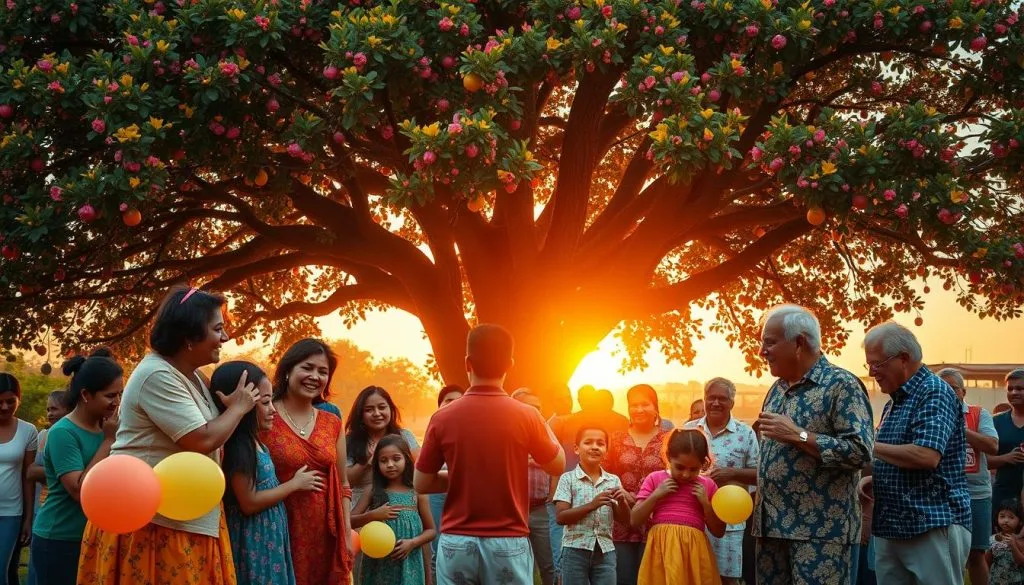A surprising fact shows that 10% of U.S. senators join Bible study groups. This shows how faith deeply affects leaders. It also shows how Christian stories shape beliefs and identities, even in high places.
We look at how stories change Black Christians, especially in raising kids proud of their faith and culture.
Key Takeaways
- Storytelling is a powerful tool for shaping the faith and identity of Black Christians.
- Celebrating Black joy, resilience, and cultural heritage through narratives empowers children and fosters a strong sense of self.
- Navigating the intersection of Blackness and Christianity requires nuanced understanding and open dialogue.
- Representation and diversity in faith-based narratives are crucial for amplifying underrepresented voices.
- Shared experiences and community support play a vital role in the spiritual formation of Black Christians.
The Importance of Storytelling in Shaping Identity
Storytelling is a powerful tool for Black Christians. It opens a window into Black theology, showing the depth of faith in the Black community. Through stories, people can connect with their cultural heritage, linking their faith and identity closely.
Stories as a Window into Black Theology
Narratives shed light on Black theology, a field that has grown in recent years. Theologians like Dietrich Ritschl and Johann Baptist Metz highlight the role of stories in understanding God’s revelation. This narrative theology helps Black Christians explore their faith through personal stories.
The Power of Narratives in Affirming Faith and Culture
Narratives also affirm the cultural heritage of Black Christians. Theologians such as Stanley Hauerwas emphasize the role of stories in shaping character and morality. This approach helps individuals reflect on their experiences and values, shaping their identity and faith.
“Narratives are seen as having ethical potential to enrich or replace principle ethics and play a significant role in constructing identity and character.”
The Black Christian community finds strength in storytelling. It helps them affirm their faith and identity. Personal stories offer solace, inspiration, and a connection to their cultural roots, boosting their sense of belonging and self-love.
Celebrating Black Joy and Resilience through Stories
In a world that often focuses on the burdens and struggles of the Black community, it’s vital to highlight the joy and resilience that have sustained us. Through storytelling, we can celebrate the triumphs and spirit of Black people.
The Haitian Revolution, led by Toussaint Louverture, and Anna Murray Douglass’s help to Frederick Douglass, show our community’s unbreakable spirit. These stories remind us of our strength through dark times.
The Black church has been a source of comfort and empowerment against racial bigotry. Coretta Scott King’s courage in the face of threats and a bombing of her home shows faith’s power in seeking justice.
Stories like Prathia Hall’s influence on Martin Luther King Jr.’s “I have a dream” speech highlight the link between activism and faith. They show that fighting for justice is a spiritual battle as well.
By embracing Black history’s joy and resilience, we challenge dominant narratives of oppression. We celebrate the strength, creativity, and determination that have moved our community forward, despite adversity.
“Imagination is a virtue essential for pursuing justice, emphasizing the necessity of envisioning a different world in the fight for equality and peace.”
By celebrating Black joy and resilience, we honor our legacy and pave the way for a future where the Black experience is fully recognized and celebrated.

Embracing these narratives uplifts our community’s spirit and inspires others to join the fight for justice, equality, and true liberation. The stories we tell shape our identity, faith, and hope for a brighter tomorrow.
Passing Down Generational Wisdom and Traditions
Storytelling is a powerful way to keep cultural heritage alive in the Black Christian community. Elders share their life stories, lessons, and ancestral roots with younger ones. This helps pass down wisdom from one generation to the next.
Preserving Cultural Heritage through Storytelling
Storytelling is more than just a hobby; it’s a sacred tradition. It connects today to yesterday, filling younger lives with the wisdom and traditions of their ancestors. By sharing their ancestors’ stories, Black Christians instill pride, identity, and a sense of belonging in their kids and grandkids.
These stories link the past to the present, helping younger folks understand their cultural heritage and their people’s resilience. Through storytelling, the Black Christian community keeps its collective memory alive. This way, the victories, struggles, and triumphs of past generations are not forgotten.
| Cultural Tradition | Significance | Storytelling Example |
|---|---|---|
| Honoring Elders | Elders are revered for their wisdom and experience, with their guidance and teachings passing down through generations. | Grandparents sharing stories of overcoming adversity and the importance of faith during their lifetime. |
| Celebration of Milestones | Significant life events, such as births, weddings, and graduations, are marked with joyful celebrations, each one carrying its own set of traditions. | Recounting the story of a family’s first college graduate and the sacrifices made to ensure their success. |
| Culinary Traditions | Recipes and cooking methods are passed down, preserving the flavors and aromas that evoke cherished memories and cultural identity. | Grandmother teaching her grandchildren the secrets to making the perfect pecan pie, a family favorite for generations. |
By integrating these stories into their lives, Black Christians honor their heritage and empower their future. They instill pride and a sense of belonging in their children and grandchildren.
“The elders of the community are the gatekeepers of our traditions. Their stories are the threads that hold our cultural tapestry together.” – Pastor James Williams
Navigating the Intersection of Blackness and Christianity
For many Black Christians, blending their racial identity with their faith is complex. They strive to accept both their Blackness and Christianity, facing unique challenges along the way. Finding a balance is key.
The mix of Blackness and Christianity can be like a delicate dance. People navigate their experiences, balancing their cultural heritage with the history of Christianity. Christianity has been both a comfort and a source of oppression for many Black people.
“The church has not always been a safe haven for Black people, as it has historically been complicit in perpetuating systems of racism and discrimination,” explains Lisa Fields, the founder of the Jude 3 Project. “This has led some to question the compatibility of their Blackness and their Christian faith.”
Yet, for many, their faith is a source of strength and identity. They find comfort in Black biblical stories and the tradition of Black theology. The Black church’s enduring presence in their communities is also a source of solace.
Black Christians seek to honor both their racial and religious identities. They explore Black spiritual practices and engage with Black theologians. They also amplify the voices of Black leaders in the Christian community.
The journey of reconciling Blackness and Christianity is deeply personal. By embracing this complexity, Black Christians can create a more inclusive and empowering faith expression.
Fostering Pride and Self-Love in Black Children
As parents, educators, and community leaders, we must empower Black children. We need to nurture their pride and self-love. By sharing stories that challenge societal narratives and celebrate Black identity, we can help them develop a strong sense of self. They will also appreciate their cultural heritage deeply.
Stories that Challenge Societal Narratives
Black children often see negative portrayals and stereotypes in the media. It’s important to counter these harmful messages. Stories that showcase Black excellence, resilience, and joy can inspire our youth to embrace their identity with confidence and pride.
- Celebrate the achievements of influential Black leaders, artists, and innovators.
- Highlight the rich history and contributions of the Black community.
- Encourage discussions about the importance of representation and diversity in media and literature.
By exposing Black children to these positive, affirming narratives, we can help them develop a strong sense of self-worth. This will cultivate their self-love. It will also prepare them to navigate the challenges they may face in a society that often fails to recognize their inherent value.

“The most powerful weapon in the world is the human soul on fire.” – Ferdinand Foch
As we work to foster pride and self-love in Black children, let’s remember the transformative power of storytelling. By shining a light on narratives that celebrate and empower, we can help our youth build a foundation of confidence, resilience, and self-acceptance. This will serve them well throughout their lives.
Christian stories
In the rich tapestry of Christian literature, there’s a vibrant collection of stories from Black believers. These tales show the unique challenges and triumphs of the Black Christian community. They offer a deeper look into the diverse nature of faith.
One story is about a man who cared for over 20 adopted children with his wife. Another is about Zhang, who lived over 40 years paralyzed but never lost his faith. These stories highlight the strength and resilience of the Black church.
Brother Adong’s journey from drug addiction to faith is inspiring. Pastor Ren Chuanyu’s legacy as the “father” of 87 children and founder of an orphanage is remarkable. These stories show how Christian narratives shape identities.
The article also looks at Christian-themed films and literature that highlight Black voices. Films like “Forty-Seven Days with Jesus” and books like “The Book of Daniel” offer a glimpse into Black theology and spirituality. These stories entertain and educate, showing the diversity of Black Christian experiences.
This article aims to inspire and deepen appreciation for Black Christians’ experiences. It contributes to the ongoing dialogue on representation, diversity, and faith’s transformative power.
| Book Title | Description | Discount |
|---|---|---|
| “Little Pilgrim’s Progress & Little Christmas Carol: Illustrated Bundle” | A bundle of two classic Christian tales for children | 17% off |
| “Who Are You?: A Little Book about Your Big Identity” | A book exploring personal identity and purpose | 31% off |
| “The Biggest Story Curriculum: Box Set” | A comprehensive curriculum exploring the grand narrative of the Bible | 27% off |
| “Tales That Tell the Truth (15-Volume Set)” | A collection of 15 storybooks that teach biblical truths | 25% off |
| “The Dream Keeper Saga (4-Volume Set)” | A four-book fantasy series exploring faith and identity | 33% off |
These Christian stories showcase the rich tapestry of faith and storytelling’s power. By highlighting these voices, we gain a deeper understanding and appreciation for Black Christians. This strengthens the Christian community and inspires renewed faith and identity.
Representation and Diversity in Faith-Based Narratives
Amplifying Underrepresented Voices
In faith-based stories, seeing diverse voices is key. The Christian experience is rich and varied, yet often overlooked. Underrepresented voices, like those of Black Christians, need to be heard and celebrated. This makes the Christian community more inclusive and true to its diverse roots.
Stories of faith help pass down values and morals. They shape who we are and what we believe. By embracing stories from all walks of faith, we learn to value the unique experiences of underrepresented groups. This enriches our understanding of the Christian faith.
“The themes in spiritual narratives vary and often address universal questions about existence, morality, and the universe, with a prevalent theme being the conflict between good and evil, portraying moral and ethical dilemmas faced by characters and the eternal struggle between positive and negative forces.”
The Dove Awards have worked to highlight underrepresented voices in Christian music. The 55th Dove Awards showed a big step forward. It celebrated the diversity of backgrounds in Christian music.
It’s important to keep celebrating the inspiring stories of faith. We must make sure all voices are heard. This means not just paying lip service to diversity, but truly valuing the unique experiences that make the Christian faith rich and vibrant.
The Role of Stories in Spiritual Formation
Stories deeply influence the spiritual growth of Black Christians. They open up beliefs, values, and faith journeys. This shapes a strong, resilient, and true spiritual identity.
Through storytelling, Black Christians delve into their faith. They explore how Blackness and Christianity meet. Inspirational stories of resilience, joy, and wisdom give a sense of belonging and cultural pride.
The Apostle Paul says in Romans 3:23 and Romans 6:23 we are all sinners needing God’s grace. Stories show the grace’s power, how faith can overcome challenges.
“For by grace you have been saved through faith. And this is not your own doing; it is the gift of God.” – Ephesians 2:8
The Parable of the Good Samaritan, the story of Yusuf (Joseph), and the Bhagavad Gita show narratives’ impact on faith. They do this across different religions.
Studies like “Practicing the Way” by John Mark Comer highlight storytelling’s role. They focus on being with, becoming like, and doing as Jesus did. This shows storytelling’s power to change us.
James 2:14 asks, “What good is faith without works?” Our stories motivate us to act out our faith. They turn belief into actions that show Christ’s love and compassion.
Exploring Blackness, Christianity, and storytelling’s power is key. Embracing these stories deepens our faith, heritage, and community ties. It strengthens our resilience and shapes a genuine spiritual identity.
| Spiritual Narrative | Key Themes |
|---|---|
| Parable of the Good Samaritan | Compassion, Love for Neighbor |
| Story of Yusuf (Joseph) | Patience, Faith, Forgiveness |
| Bhagavad Gita | Duty, Righteousness, Spiritual Fulfillment |
Building a Supportive Community through Shared Experiences
At the heart of the Black Christian experience is the power of community. Research by Brene Brown shows that resilience and social support are linked. By making meaningful connections, Black Christians can build a space of shared understanding and growth.
Creating Safe Spaces for Open Dialogue
Vulnerability is key in building strong communities. It lets people form real bonds by sharing their experiences and challenges. By making safe spaces for open dialogue, Black Christians can create a place of trust.
In this space, everyone’s views and stories are valued and respected. This spirit of community is rooted in biblical teachings. The early church showed us the power of coming together, supporting each other, and learning from one another.
The stories of Ruth and Acts in the Bible highlight this. They show how community can offer loyalty, inclusion, and support. This strengthens our faith and sense of identity.
FAQ
How does storytelling shape the faith and identity of Black Christians?
Why is it important to celebrate Black joy and resilience through storytelling?
How does storytelling help preserve cultural heritage and pass down generational wisdom within the Black Christian community?
What are the challenges and nuances in navigating the intersection of Blackness and Christianity?
How can storytelling foster pride and self-love in Black children?
What is the significance of Christian stories that celebrate the experiences and perspectives of Black Christians?
Why is it important to amplify the voices of underrepresented groups, such as Black Christians, in faith-based narratives?
How can stories shape the spiritual formation of Black Christians?
How can the sharing of experiences through storytelling build a supportive community among Black Christians?
Source Links
- Book review of “The Power Worshippers. Inside the dangerous rise of religious nationalism” – https://energyskeptic.com/2024/book-review-of-the-power-worshippers-inside-the-dangerous-rise-of-religious-nationalism/
- Deeper Waters – https://www.deeperwatersapologetics.com/
- Evolving Faith: Ep. 17 Identity, Belonging, and Disability – https://evolvingfaith.com/podcast/season-1/ep-17
- Confessing Together: How the Creed Proclaims You are Not Your Own – The Lutheran Witness – https://witness.lcms.org/2024/confessing-together-how-the-creed-proclaims-you-are-not-your-own/
- Exploring Ethical Potentials of Christian Narrative Testimonies – https://www.degruyter.com/document/doi/10.1515/opth-2024-0015/html
- [Season 5: EP 66] Alencia Johnson (1063 West Broad) Chief Impact Officer & Founder by A Dose of Black Joy and Caffeine – https://podcasters.spotify.com/pod/show/justin-adu/episodes/Season-5-EP-66-Alencia-Johnson-1063-West-Broad-Chief-Impact-Officer–Founder-e1trkn0
- RNS | Covering the world of religion – https://religionnews.com/2024/10/08/jemar-tisby-on-the-spirit-of-justice-and-the-black-christians-who-pursued-it/
- Overcoming Our Ahistoric Age – https://www.thegospelcoalition.org/podcasts/gospelbound/overcoming-ahistoric-age/
- Grandparents Across Faiths: Beautiful Quotes That Celebrate Their Role – https://www.devotedgrandma.com/grandparenting/grandparents-across-faiths-beautiful-quotes-that-celebrate-their-role/
- The Age of Opportunity: How the Bible Gives Hope for Aging – Christian Research Institute – https://www.equip.org/articles/the-age-of-opportunity-how-the-bible-gives-hope-for-aging/
- The Intersection – https://www.dougresler.com/
- Church Disappointment Is Multilayered – Christianity Today – https://www.christianitytoday.com/2024/10/lisa-fields-when-faith-disappoints-church-hurt/
- I left my religion. Should I still raise my kid with it? – https://www.vox.com/future-perfect/378423/religion-humanism-atheism-parenting-good-without-god
- Amy Medina – https://amy-medina.com/
- STORIES – China Christian Daily – https://chinachristiandaily.com/section/china/STORIES
- 10 Biblical Epics and Christian Movies You Can Stream Right Now – https://www.pureflix.com/insider/biblical-epics-you-can-stream
- Christian Children’s Books – https://www.wtsbooks.com/pages/children?srsltid=AfmBOooguZMHatAQtfngadO8lMqvFnYc2QYSoNcTJXhrFE940u9vtNrz
- Spiritual Narratives: Definition & Themes – https://www.studysmarter.co.uk/explanations/religious-studies/spirituality/spiritual-narratives/
- The 116 Life Ep. 90: Who Do You Do It For? – https://holyculture.net/read/the-116-life-ep-90-who-do-you-do-it-for/
- Spiritual Formation – https://www.biblejournal.net/2024/10/17/spiritual-formation/
- Spiritual Narratives: Definition & Themes – https://www.vaia.com/en-us/explanations/religious-studies/spirituality/spiritual-narratives/
- Evangelism and Your Personal Story – https://outreachmagazine.com/features/evangelism/57689-evangelism-and-your-personal-story.html
- Desire for Community — Retreat, Reflect, Renew – https://www.retreatreflectrenew.org/monthly-reflections/desire-for-community
- 4 Inspiring Examples of Community in the Bible – https://answeredfaith.com/examples-community-bible/
